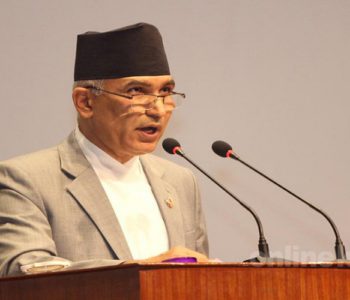Nepal achieves first-ever sovereign credit rating: A historic milestone

KATHMANDU: For the first time in history, Nepal has received a sovereign credit rating, marking a significant milestone for the nation. Fitch Ratings, one of the world’s leading credit rating agencies, has awarded Nepal a ‘BB-’ rating, positioning the country as a notable player in the South Asian economic landscape. While the rating is two notches below India’s, it stands out as the best among South Asian countries, reflecting Nepal’s promising economic outlook and financial stability.
This rating comes as a crucial development for Nepal, a country that has long been categorized as “non-rated” in the international financial market. The move opens the door to greater financial credibility and opportunities to attract foreign investments.
A Historic Achievement for Nepal
Fitch Ratings based its decision on Nepal’s strong foreign currency reserves and robust economic growth projections. The agency recognized Nepal’s efforts to maintain external liquidity, driven by its burgeoning hydropower sector and low external debt burden.
Chartered Accountant Anilraj Bhattarai, commenting on the milestone, described the rating as a historic achievement.
“This is a remarkable accomplishment, particularly for a first-time rating. It reflects Nepal’s economic resilience and its potential to stabilize its financial ecosystem in the short term,” he said.
Understanding Sovereign Credit Ratings
Sovereign credit ratings are assessments of a country’s creditworthiness, conducted by global agencies such as Fitch, Standard & Poor’s (S&P), and Moody’s. These ratings evaluate a country’s ability to meet its debt obligations and the risks associated with investing in its government bonds.
Ratings range from ‘AAA’ (the highest) to ‘C’ (the lowest). Investment-grade ratings, such as those above ‘BBB-’, signal a low-risk environment for investors, while speculative-grade ratings indicate higher risks.
Nepal’s ‘BB-’ rating places it within the speculative-grade category. However, for a country receiving its first-ever rating, this score is seen as highly encouraging.
“This rating underscores Nepal’s financial stability in the short term, while also highlighting areas for improvement to achieve higher ratings in the future,” Bhattarai explained.
Factors Behind Nepal’s ‘BB-’ Rating
Fitch Ratings attributed Nepal’s rating to several key factors:
Low External Debt Burden: Nepal’s external debt remains minimal and highly concessional, reducing repayment risks.
Hydropower Potential: The rating agency highlighted Nepal’s strong growth projections, largely driven by its hydropower sector. The sector is expected to play a pivotal role in boosting the country’s GDP and strengthening external liquidity.
External Liquidity: Nepal has maintained strong foreign currency reserves, bolstering its economic resilience in a volatile global market.
Manageable Fiscal Deficit: Fitch projected that Nepal’s fiscal deficit would shrink to 4% of GDP by 2026, nearing the benchmark of 3% required for a higher ‘BB’ rating.
However, the agency also noted challenges such as political instability and structural governance issues, which have hindered Nepal’s progress in qualitative metrics.
Opportunities Created by the Rating
Nepal’s transition from a “non-rated” to a rated country is a significant development with far-reaching implications. Bhattarai emphasized the importance of this achievement:
“Previously, Nepal was not evaluated by credible third-party institutions, leaving foreign investors uncertain about the country’s financial stability. Now, a reliable entity has assessed Nepal’s economic position, which will boost investor confidence.”
The sovereign rating is expected to open new pathways for Nepal in the following ways:
Attracting Foreign Investment: The rating signals to international investors that Nepal is a viable destination for investment. It enhances the country’s image as a trustworthy and stable investment hub in South Asia.
Facilitating Access to Global Markets: With a sovereign rating in place, both the government and private sector can now access international financial markets more easily. This includes raising funds through bonds and other financial instruments.
Strengthening Economic Credibility: The rating reinforces Nepal’s credibility in the global financial ecosystem, paving the way for improved bilateral and multilateral financial relationships.
Addressing Resource Shortages: In times of financial constraints, the rating will help Nepal secure external loans to support its development initiatives, particularly as grants from international agencies decline.
Challenges to Overcome
Despite the positive rating, Fitch highlighted areas where Nepal needs improvement. Political instability and administrative inefficiencies remain significant hurdles. Structural governance issues, corruption, and a lack of regulatory reforms also pose challenges to achieving higher ratings.
Bhattarai emphasized that addressing these challenges is crucial for Nepal’s long-term economic growth:
“Our political and administrative frameworks require substantial reforms. Enhancing governance, reducing corruption, and creating a more stable policy environment will be key to achieving better ratings in the future.”
Roadmap for Improvement
The sovereign rating provides Nepal with a roadmap to enhance its financial standing. By addressing the weaknesses highlighted in the rating, Nepal can aim for higher ratings such as ‘BB+’ or even ‘BBB’ in the coming years.
“This rating is not static; it is reviewed semi-annually. Nepal now has an opportunity to make necessary improvements and climb the rating ladder,” Bhattarai said.
Nepal’s Journey to Its First Sovereign Rating
The journey to Nepal’s first sovereign rating began in 2019 when the government decided to engage Fitch Ratings for the task. However, delays caused by various factors, including political changes and economic uncertainties, stalled the process.
The initiative was revived in recent years, with Fitch being re-engaged due to its prior selection. Standard Chartered Bank served as Nepal’s rating advisor, with financial support from the UK’s Foreign, Commonwealth & Development Office (FCDO).
The rating process faced skepticism, as weak economic indicators raised concerns about a potential poor rating. However, Nepal’s progress in maintaining fiscal discipline and enhancing its economic outlook eventually led to the historic ‘BB-’ rating.
Looking Ahead
Nepal’s first sovereign credit rating marks a significant step in its economic journey. While the ‘BB-’ rating reflects short-term stability, it also highlights areas for improvement.
By leveraging this milestone, Nepal can attract foreign investments, strengthen its financial ecosystem, and work towards achieving higher ratings in the future. With strategic reforms and a focus on governance, the country has the potential to position itself as a competitive player in the global financial market.
As Bhattarai aptly summarized, “This rating is both an achievement and an opportunity. It is now up to Nepal to capitalize on this milestone and work towards sustained economic growth and stability.”











Facebook Comment